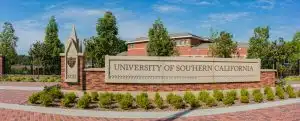USC Debate Team
The world of debate is an intense and complex one. It combines logic, rhetoric, and effective communication techniques. The University of Southern California’s Debate Team is at the forefront of this intellectual battlefield.
Understanding the Basics of Debate
To fully appreciate the successes of the USC Debate Team, it’s first essential to understand the foundations of debate. Debating is an art that predates even the most ancient civilizations. It is a form of argument that is organized, structured, and based on logic and reasoning.
Debate trains people to engage in thoughtful discussion. It challenges individuals to question ideas, dismantle arguments, and rebuild their own coherently and persuasively.
When we delve into the history of debate, we find its roots in ancient Greece, where it was an integral part of the democratic process. Citizens would gather in the central public space agora to engage in lively debates. These debates were not only a means of expressing one’s opinions but also a way to shape public opinion and influence decision-making.
The art of debate has evolved, adapting to different cultures and societies. In medieval Europe, scholars often debated ideas and challenged prevailing beliefs within universities. This tradition of intellectual discourse continues today, with universities hosting debate societies and competitions worldwide.
The Art of Argumentation
The heart of the debate lies in argumentation – the ability to construct and present a valid point with supporting evidence. This process requires diligent research, critical thinking, and a strategic approach to counter the opposing viewpoint.
Indeed, a formidable debater is one who not only builds solid arguments but also anticipates and effectively responds to the counter-arguments of the opposition. This makes argumentation a dynamic and highly competitive skill.
Debaters must rely on facts and evidence and employ rhetorical techniques to sway the audience when engaging in argumentation. Persuasive language, compelling storytelling, and emotional appeals are all tools in the debater’s arsenal.
Throughout history, many influential figures have honed their argumentation skills through debate. From renowned philosophers like Socrates and Aristotle to political leaders like Abraham Lincoln and Winston Churchill, these individuals understood the power of persuasive argumentation in shaping public opinion and effecting change.
Essential Skills for Successful Debating
Beyond argumentation, there are additional skills integral to successful debating. These skills include clear articulation, effective use of body language, and deep analysis. This is in addition to a broadened worldview honed over years of exposure to various topics from various spheres, including politics, economics, philosophy, and more.
Debate also fosters critical thinking, as debaters must evaluate the strengths and weaknesses of different perspectives and formulate well-reasoned responses. This ability to analyze complex issues and think critically is valuable in debate competitions and everyday life, enabling individuals to make informed decisions and navigate a world filled with diverse opinions.
The ability to quickly adapt and respond effectively when under pressure is also essential. This mental agility is advantageous in debate competitions and real-world scenarios. Whether it’s a job interview, a negotiation, or a public speaking engagement, the skills developed through debate can be applied to various situations, empowering individuals to communicate their ideas confidently and persuasively.
Furthermore, debate fosters teamwork and collaboration. Debates are often team efforts, requiring a cohesive strategy and unified front. This collaborative aspect of debate enhances communication skills and cultivates empathy and respect for different viewpoints.
In conclusion, the art of debate is a rich and multifaceted discipline that goes beyond mere argumentation. It encompasses various skills and attributes, from research and critical thinking to effective communication and adaptability. By understanding the foundations of debate and appreciating its significance, we can better recognize and celebrate the achievements of the USC Debate Team.
The History and Evolution of the USC Debate Team
The USC Debate Team carries a rich history filled with achievements and evolution. Let’s delve deeper into the journey of this esteemed team.
Founding and Early Years
The team was officially founded in the 1880s, inspired by the culture of argumentation prevalent in academic discourse at that time. As the University of Southern California (USC) embraced the importance of critical thinking and effective communication, the debate team emerged as a platform for students to hone their persuasive argumentation and logical reasoning skills.
During its early years, the USC Debate Team faced numerous challenges. However, the team gradually gained recognition and respect within the academic community through sheer determination and unwavering commitment. As more students joined the ranks, the team’s influence extended beyond the university campus.
Each year, the USC Debate Team grew exponentially in size and prestige. The team’s success can be attributed to the dedication of its members, who tirelessly researched, practiced, and refined their debating skills. This commitment to excellence laid the foundation for the team’s future triumphs.
Notable Achievements and Milestones
Successes in national and international debate forums mark the Team’s history. The USC Debate Team consistently demonstrated its prowess, captivating audiences with eloquence and intellectual prowess.
Perhaps most noteworthy is the Team’s consistent top placements in high-profile debating championships. The USC Debate Team showcased their exceptional skills year after year, securing numerous accolades at regional, national, and international tournaments. Their victories in the prestigious Harvard and Yale Debate Tournaments are shining examples of their dominance, solidifying USC’s status as a significant contender on the global stage.
These achievements brought glory to the university and inspired future generations of debaters. The USC Debate Team became a symbol of excellence, attracting talented individuals who aspired to follow in the footsteps of their predecessors.
As the USC Debate Team continued to evolve, it embraced new methodologies and adapted to the changing landscape of debate. The team incorporated innovative techniques, such as integrating technology into their research and utilizing multimedia presentations to enhance their arguments. This forward-thinking approach allowed the team to stay at the forefront of debate and maintain their competitive edge.
Furthermore, the USC Debate Team actively engaged in community outreach programs, organizing workshops and seminars to promote the art of debate among high school students. The team aimed to foster a new generation of critical thinkers and effective communicators by sharing their knowledge and expertise.
Today, the USC Debate Team is a testament to the power of intellectual discourse and the pursuit of excellence. With a rich history and a promising future, the team continues to shape the minds of future leaders, preparing them to navigate the world’s complexities through the art of debate.
The Role of the USC Debate Team in Student Development
The USC Debate Team also plays a significant role in fostering the development of its students outside of the competition arena.
But what exactly does this development entail? Let’s delve deeper into how the USC Debate Team enhances critical thinking skills and fosters effective student communication.
Enhancing Critical Thinking Skills
By its very nature, debate enhances a student’s critical thinking skills. The rigors of debate training push students to analyze complex issues and synthesize coherent, defensible arguments. But what does this mean in practice?
Imagine a debate on climate change. Debaters would need to research and understand the scientific evidence, economic implications, and societal impact of climate change. They would then have to analyze this information, identify patterns and trends, and form logical connections between different pieces of evidence. This critical thinking process allows debaters to deeply understand complex topics and present their arguments with clarity and conviction.
Moreover, the benefits of such critical thinking skills are not confined to the debate stage; they also extend to academic work and professional life. Students who participate in debate often excel in their coursework, as they have honed their ability to dissect complex problems and develop well-reasoned arguments. These skills also prove invaluable in the workplace, where the ability to think critically and make sound decisions is highly sought after.
Fostering Effective Communication
Skillful communication is another boon of debate training. It goes beyond just speaking articulately; it’s about conveying thoughts and ideas in a way that resonates with the listener. But how exactly does debate training foster this skill?
Debaters learn to structure their arguments systematically and present them convincingly. They develop the ability to organize their thoughts coherently, ensuring their arguments flow logically and persuasively. This skill is not limited to verbal communication; debaters also learn to express their ideas effectively in writing, as they often have to prepare written cases and rebuttals.
Furthermore, debate training teaches students the importance of active listening and respectful engagement. Debaters must carefully listen to their opponents’ arguments, identify weaknesses, and respond thoughtfully. Active listening and respectful engagement improve communication skills and foster empathy and understanding.
These communication skills are highly transferable and can be applied in various settings. Communicating effectively is essential for success in any field, whether giving a presentation, participating in group discussions, or negotiating with colleagues.
The Impact of the USC Debate Team on the University
The USC Debate Team’s success has had far-reaching effects, contributing significantly to the university’s broader culture and reputation.
Founded in 1880, the USC Debate Team has a long and illustrious history. Over the years, they have become renowned for their exceptional argumentation and critical thinking skills. Their dedication to research, public speaking, and persuasive communication has brought them numerous accolades and left an indelible mark on the university.
Contributions to the Academic Reputation
USC’s Debate Team has bolstered the university’s academic profile. Their achievements in prestigious debate tournaments have spotlighted the institution’s commitment to intellectual rigor, thus attracting bright minds from around the world. The team’s rigorous training and participation in high-level debates have sharpened their skills and elevated the academic standards at USC.
Moreover, the team’s success has increased funding and resources for the university’s debate program. This has allowed for the recruitment of top-tier coaches and the establishment of state-of-the-art debate facilities. As a result, USC has become a hub for aspiring debaters, further enhancing its reputation as a leading institution for intellectual discourse.
Influence on Student Life and Culture
The Debate Team’s influence is not only academic but social as well. Debaters, with their sharp minds and passionate voices, have often been at the forefront of student-led initiatives, thus influencing the culture and atmosphere on campus. Their involvement in various clubs, organizations, and student government has helped shape the university’s vibrant and inclusive community.
Furthermore, the team’s commitment to public speaking and effective communication has inspired students from all disciplines to develop their skills. Debaters serve as mentors and role models, offering workshops and training sessions to help fellow students improve their public speaking abilities. This cross-pollination of skills and ideas has fostered a culture of intellectual curiosity and open dialogue, making USC a hub for academic growth and innovation.
Outside of the university, the Debate Team’s success has also positively impacted the local community. They frequently engage in outreach programs, visiting local high schools and organizing debate workshops for aspiring young debaters.
By sharing their expertise and passion, they inspire the next generation of critical thinkers and communicators, leaving a lasting legacy beyond the confines of the university campus.
How Do You Become a Member?
Joining the USC Debate Team is not just a matter of showing up; it’s a rigorous process that tests your mettle, intellect, and passion for the craft. The first step usually involves attending an informational session to meet current team members and coaches.
This is your golden opportunity to ask questions, understand the team’s culture, and gauge whether this fits you. After this, you’ll likely be invited to participate in workshops to assess your debating skills and potential.
These workshops serve as a precursor to the formal recruitment process and offer a glimpse into the commitment and skill required. The USC Debate Team is not just about winning arguments; it’s about fostering a community of intellectuals who are deeply committed to persuasive communication.
The Recruitment Process
The recruitment process for the USC Debate Team is a multi-tiered endeavor that aims to identify candidates who possess strong debating skills and fit well with the team’s ethos. After the initial workshops, candidates must usually go through a formal audition.
This involves participating in mock debates judged by current team members and coaches. Don’t be surprised if you’re thrown a curveball topic; the team values your ability to think on your feet.
Following the audition, there may be an interview where you’ll discuss your interest in debate, your academic commitments, and how you envision contributing to the team’s legacy. It’s not just about what the team can offer you but also what you can offer to this esteemed community.
The final stage often involves a probationary period where you’ll attend practices, participate in internal debates, and perhaps even represent the team in smaller competitions.
Successfully navigating this stage solidifies your place on the USC Debate Team, opening the door to a transformative college experience.
Skills and Qualities the Team Looks For
The skills and qualities the USC Debate Team seeks are not just about how well you argue or how many facts you can spout. The team values diverse skills, including research understanding, logical reasoning, and the ability to articulate complex ideas clearly.
Emotional intelligence is also crucial; reading your opponent and the audience can give you a significant edge in competitions. But beyond these skills, the team is keen on individuals who bring something unique to the table—be it a different debating style, specialized knowledge in a particular field, or even the ability to rally the team’s spirits.
They’re looking for committed, reliable members and willing to work to improve continuously. After all, the USC Debate Team is more than a group of skilled debaters; it’s a brotherhood and sisterhood of intellectuals who challenge each other to reach new heights in debate and life.
The Future of the USC Debate Team
As we look ahead, the future of the USC Debate Team appears incredibly promising. The team is poised for even more significant achievements with a history steeped in accolades and a current roster teeming with talent.
The focus is not just on winning competitions but also on expanding the team’s influence within the academic community and the public sphere. Plans are underway to host workshops and seminars to engage students across disciplines, fostering a campus-wide culture of articulate discourse.
Moreover, the team is exploring partnerships with organizations that align with their mission, thereby broadening their reach and impact. In an era where the quality of public debate often leaves much to be desired, the USC Debate Team stands as a beacon of intellectual rigor and ethical argumentation.
Upcoming Competitions and Events
Regarding the competitive landscape, the USC Debate Team has a packed calendar filled with national and international events. Among the most anticipated are the National Debate Tournament and the World Universities Debating Championship, where the team aims to participate and dominate.
These competitions serve as platforms for the team to showcase their skills, but they are also opportunities for individual members to gain recognition and open doors for their future careers.
Additionally, the team plans to host its debate tournament, inviting schools from across the country to participate. This event aims to set a new standard for debate competitions, emphasizing the quality of arguments and the importance of ethical conduct and sportsmanship. The USC Debate Team is committed to elevating the level of debate both at home and on the world stage.
Strategies for Continued Success
To ensure their trajectory continues upward, the USC Debate Team implements a multi-faceted strategy for success. First and foremost is the emphasis on continuous learning and improvement.
Regular training sessions are supplemented with guest lectures from experts in various fields, providing team members with a well-rounded education that goes beyond the typical debate topics.
Secondly, the team is investing in advanced research tools and databases to give them an edge in preparing for debates. But perhaps most importantly, there is a focus on team cohesion and mental well-being.
Team-building activities and stress management workshops are integral parts of the training regimen. After all, a team that works well together is far more effective than a group of individuals, regardless of their talent. The USC Debate Team understands that their strength lies in their ability to argue and their unity as a team committed to excellence.
Ready to Debate Your Way into Your Dream College?
If you’re inspired by the USC Debate Team’s excellence and aim for a similar path of academic and extracurricular achievement, AdmissionSight is here to guide you. We specialize in helping students like you navigate the complex world of college admissions.
From crafting compelling essays to preparing for interviews, our expert consultants offer personalized guidance every step of the way. Don’t leave your college dreams to chance; let’s strategize your path to success together.










































